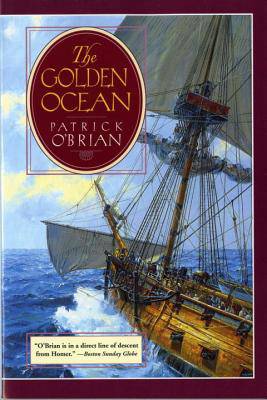
- Afhalen na 1 uur in een winkel met voorraad
- Gratis thuislevering in België vanaf € 30
- Ruim aanbod met 7 miljoen producten
- Afhalen na 1 uur in een winkel met voorraad
- Gratis thuislevering in België vanaf € 30
- Ruim aanbod met 7 miljoen producten
Zoeken
Omschrijving
In the year 1740, Commodore (later Admiral) Anson embarked on a voyage that would become one of the most famous exploits in British naval history. Sailing through poorly charted waters, Anson and his men encountered disaster, disease, and astonishing success. They circumnavigated the globe and seized a nearly incalculable sum of Spanish gold and silver, but only one of the five ships survived the voyage. This is the background to the first novel Patrick O'Brian ever wrote about the sea, a precursor to the critically acclaimed Aubrey/Maturin series. The Golden Ocean shares the excitement and the rich humor of those books, invoking the eloquent style and attention to historical detail that O'Brian fans know so well. The protagonist of this story is Peter Palafox, son of a poor Irish parson, who signs on as a mid-shipman, never before having seen a ship. He is a fellow who would have delighted the young Stephen Maturin or Jack Aubrey . . . and quarreled violently with them as well. Together with his life-long friend Sean, Peter sets out to seek his fortune, embarking upon a journey of danger, disappointment, foreign lands, and excitement. Here is a tale certain to please not only admirers of O'Brian's work, but any reader with an adventurous soul.
Specificaties
Betrokkenen
- Auteur(s):
- Uitgeverij:
Inhoud
- Aantal bladzijden:
- 288
- Taal:
- Engels
Eigenschappen
- Productcode (EAN):
- 9780393315370
- Verschijningsdatum:
- 1/10/1996
- Uitvoering:
- Paperback
- Formaat:
- Trade paperback (VS)
- Afmetingen:
- 130 mm x 216 mm
- Gewicht:
- 226 g

Alleen bij Standaard Boekhandel
+ 76 punten op je klantenkaart van Standaard Boekhandel
Beoordelingen
We publiceren alleen reviews die voldoen aan de voorwaarden voor reviews. Bekijk onze voorwaarden voor reviews.








